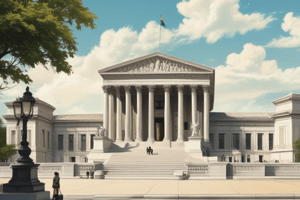Podcast
Questions and Answers
An appeal by way of 'case stated' on a point of law may be made to the Divisional Court of the Queen's Bench Division, in the High Court.
An appeal by way of 'case stated' on a point of law may be made to the Divisional Court of the Queen's Bench Division, in the High Court.
True (A)
From the Crown Court, there is only a right of appeal on criminal matters to the Criminal Division of the Court of Appeal.
From the Crown Court, there is only a right of appeal on criminal matters to the Criminal Division of the Court of Appeal.
False (B)
The Crown Court only deals with indictable offences and has no jurisdiction over appeals from Magistrates' Courts.
The Crown Court only deals with indictable offences and has no jurisdiction over appeals from Magistrates' Courts.
False (B)
An appeal by way of 'case stated' from Magistrates' Courts can be made to the Divisional Court in the Chancery Division of the High Court.
An appeal by way of 'case stated' from Magistrates' Courts can be made to the Divisional Court in the Chancery Division of the High Court.
The High Court is organized into two divisions: Queen's Bench Division and Chancery Division.
The High Court is organized into two divisions: Queen's Bench Division and Chancery Division.
Civil appeals from the High Court can only be made to the Supreme Court, bypassing the Court of Appeal.
Civil appeals from the High Court can only be made to the Supreme Court, bypassing the Court of Appeal.
The Queen's Bench Division mainly deals with equity matters such as trusts and estates.
The Queen's Bench Division mainly deals with equity matters such as trusts and estates.
The Criminal Division of the Court of Appeal handles appeals related to civil cases in addition to criminal matters.
The Criminal Division of the Court of Appeal handles appeals related to civil cases in addition to criminal matters.
The Crown Court sits in 92 different towns and cities but not at the Central Criminal Court (the Old Bailey) in London.
The Crown Court sits in 92 different towns and cities but not at the Central Criminal Court (the Old Bailey) in London.
High Court judges are exclusively responsible for handling serious criminal offences in the Crown Court.
High Court judges are exclusively responsible for handling serious criminal offences in the Crown Court.




